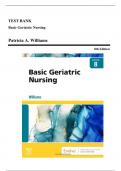Exam (elaborations)
Test Bank - Basic Geriatric Nursing, 8th Edition (Williams, 2023), Chapter 1-20 + NCLEX Case Studies with answers | All Chapters
- Course
- Institution
- Book
Test Bank - Basic Geriatric Nursing, 8th Edition (Williams, 2023), Chapter 1-20 + NCLEX Case Studies with answers | All Chapters
[Show more]



